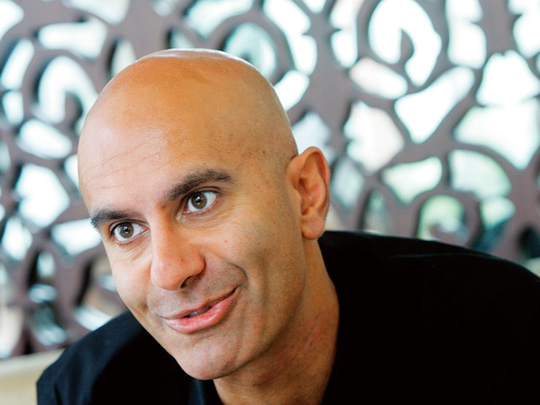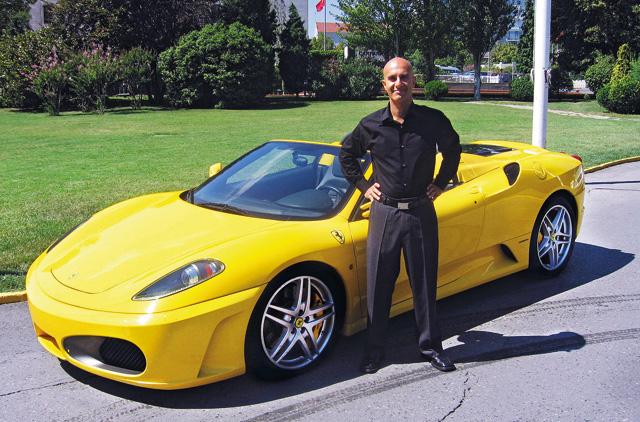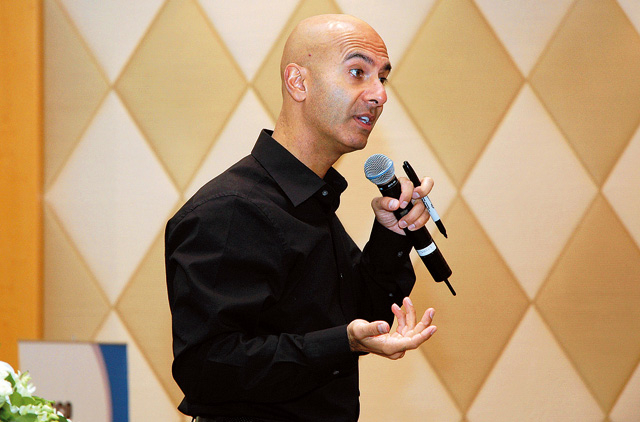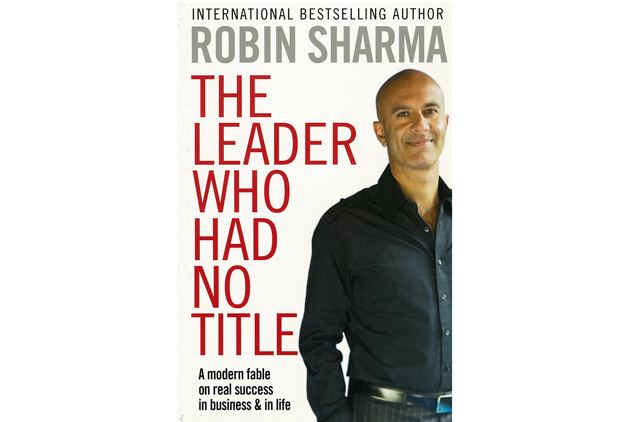
In many ways, Robin Sharma is Julian Mantle - the protagonist in his best-seller The Monk Who Sold His Ferrari. They were both high-flying lawyers battling disillusionment, but while the fictional character owned a Ferrari, Robin drove a less flashy number. Both dropped out of the race. Robin's alter ego learnt from travelling through India, Robin learnt from looking within. The Monk… happened, and there's been no looking back.
He may be among the top ten leadership gurus in the world, has worked with Fortune 500 executives and celebrity entrepreneurs as well as written 22 books including e-books, 11 of them best-sellers, but Robin Sharma doesn't dress the part. He's eschewed a business suit for a casual black open-necked shirt and plain black trousers.
At 47, he has a lean athletic body. Add a ready smile and a shining shaved head, and you get a cool regular guy. But no regular guy would ask his audience, "What would you want page 299 of your 300-page autobiography to say?" as starters. Robin does, and yet he insists, "I'm just an ordinary person." Perhaps that very ordinariness may be the secret behind his phenomenal global popularity.
When he quit his picture-perfect life as a litigation lawyer in Canada in the early 1990s, he didn't expect to receive the kind of recognition and adulation he has. The reason he gave up all the trappings was to start afresh.
"I was very successful as a lawyer, but betrayed myself in the process," says Robin. "I was living under the values society suggested I should live by to be successful. And those were not aligned to my own.''
Materialism without the saving grace of idealism was what he saw around him. It was something that was constantly on his mind and he was struggling to come to terms with it. "Due to this inner friction, I lacked energy, enthusiasm and passion so I decided to change," he says in an email interview with Friday.
There was no ‘light-bulb moment'
Robin says there must be an impetus for a person to take charge of their own lives. "When there's enough discomfort and pain, we get pushed to change," he says. "I just wasn't happy. I'd done all the things I thought a person had to do in order to be successful and fulfilled, like getting a great education and becoming a lawyer and yet, there was zero spark in my life. But there was no light-bulb moment. It was gradual. In the early 1990s I decided to experiment and try some new ways of living."
In the process of just looking within himself through meditation, Robin learned many age-old truths about himself and others - such as lack of self-discipline and lack of consideration for the self - that transformed his thinking and behaviour. He learnt to channel his energy into what he was interested in, and learnt that it was important to have fun whatever one did.
"I decided to share them in a self-help book I self-published called The Monk Who Sold His Ferrari," says Robin. "That was the beginning of it all for me." The book was published in 1997 and to market to a larger audience, Robin persuaded some bookshop owners to allow him to hold book signings. At one signing, he was approached by a man who happened to be the president of a major publishing company HarperCollins. Ed Carson offered him a deal on the spot. Since then more than three million copies have been sold in more than 50 countries and translated into more than 42 languages. It also started him on the path of superstardom; book signings, and worldwide recognition and gave him the template for his future works: anecdotal, easy-to-read self-help books.
Robin is fond of talking of ‘transformational moments'. He teaches people how to recognise them and use them to their advantage.
"If we are paying attention to our lives, we'll recognise those defining moments," he says. "The challenge for so many of us is that we are so deep into daily distractions and ‘being busy, busy' that we miss out on those moments and opportunities that - if jumped on - would get our careers and personal lives to a whole new level of wow."
Out with the old ideas, in with the new
Life has seen a sea change for Robin after The Monk... especially where leadership is concerned. "As we mature, our views change," he says. "Right now, my key message is that the old model of leadership is obsolete. I explain the idea in my book The Leader Who Had No Title. Essentially, leadership is no longer about having a title and giving orders. Instead, leadership is a mindset that shifts from being a victim to creating results. Any one of us can demonstrate leadership in our work and within our lives."
Robin advocates his theory to all companies that consult him. "The best competitive advantage for any company is to grow leaders without titles at all levels of the organisation faster than the competition," he insists.
The Leader Who Had No Title distils what Robin has learned from working with the best organisations in the world into a formula any businessperson can use to seriously change the game. "It starts with understanding that leadership is no longer about the title on your business card," he explains. "It's about influence and impact. And building leaders around you. Today, anyone can lead and smart enterprises will grow leaders at every level. This way each teammate starts doing world-class work dazzling customers by their exceptional work. To lead without a title is to understand that the old model of leadership is dead."
But how easy is that for conventional managements to do?
"Leading without a title is one of the best ways any businessperson can win in the new economy," says Robin. "I've shared the process with employees at many of the best companies in the world such as Starbucks and The Coca-Cola Company with superb results. Basically, to lead without a title is to derive your power within the organisation not from your position but from your competence, effectiveness, relationships, excellence, innovation and ethics."
However, Robin is not suggesting that titles are not important. "What I'm saying is that managers are far more influential when their power comes from their performance and the trust they've built versus from the authority they get from the title on their business card."
In times of uncertainty, companies change their workforce structure a lot. Robin suggests taking advantage of this change to become more successful. "Disruption always contains massive opportunities," he says. "Most of the companies I work with are going through deep change. But before better structures can be installed, old ones must be torn down. So, change is an opportunity to make progress. Smart leaders constantly remind their teams that all the upheaval of restructuring is part of the process to get them to a better place. As I posted on my Facebook page the other day: ‘Change is hardest at the beginning. Messiest in the middle. And best at the end'."
Build your year around five key goals
Goal setting is one of Robin's favourite tools in management and he follows his own advice. "I set goals for the new year every December," he says. "I review the year that has ended, record my wins, analyse my losses and then set five main goals for the coming 12 months. I call this my ‘Big 5'. These are my five priorities. I build every week of the coming year around advancing them. Then I set smaller goals around each of the five big ones. Small daily improvements over time create stunning results."
He suggests this simple goal-setting exercise: "Take a sheet of paper and write about how you want to be remembered when you're no longer here. In other words, your philosophy. Then write the five things that need to happen between now and your deathbed for you to feel your life is successful. Then bring that back. Write down your one-year goals, 90-day goals. Every morning take 40 minutes and review these goals. And pretty soon, you will start achieving your dream. Goals give you hope. Goals also give you inspiration, energy and momentum. I constantly write my goals. I take pictures and glue them into my journals, to make me see my goals vividly. That centres me."
It's not enough if you set goals, you have to have the discipline to carry them through. Robin offers a set of exercises to build up discipline too. "The first thing to remember is that we grow stronger by doing difficult things," he says. "Science is confirming that we can actually rewire our brains when we push ourselves to do the things we have been procrastinating. And the increased willpower we get doing one difficult but important thing gives us more power to do even bigger things."
He suggests some simple exercises to become more disciplined: "Get up early for 30 days; surround yourself with excellent people; finish what you start; keep your promises; be punctual; set and realise small goals."
We can't inspire if we don't feel inspired
Over the years Robin has built himself into a brand known in over 50 countries. But it has not been a conscious act. "The less I focus on building a personal brand and the more I focus on creating deep value for as many people as possible and doing my best work, the more my personal brand grows," he says.
Robin is more interested in developing great leaders. His dictum is simple: to become a great leader one must first become a great person.
"Becoming a great person involves many different elements that are hard to answer in a few lines," he replies. "The starting point is an appreciation of the fact that in business and in our lives, everything we do is a reflection of what's going on in our minds and within our hearts. In other words, we can't inspire a team if we're not inspired. We can't do big things in our work if we feel small inside. We can't grow our network if we have little self-worth. We can't change the world until we change ourselves.
"The ways to do that include setting aside an hour early every morning for personal development, using more powerful words, ensuring that your physical environments are inspiring to your performance, doing your most valuable work in the morning and turning off technology for an hour a day."
His big lesson is that strong leadership always depends on deeper relationships with the staff. "Take care of the relationships and the money will follow. The best businesses are extremely relationship-centric. In this world of intense competition, we all need to remember that people do business with people they like, trust and who make them feel special."
If bad times push up great leaders, then this must be the period when great leaders are being born. "In this time of great volatility, even more leaders will emerge," he predicts. "The best leaders show up not when everything's going well but when things are falling apart. Steve Jobs came back to Apple when it was close to bankruptcy. And look at what he did. Mandela and Gandhi became who they became because of the adversity they rose above."
What Robin never forgets is that people have similar concerns the world over. "My audiences across the world are of different cultures and values," he says. "Yet we are all the same. Deep within, we all want to know our work matters and that we live lives of impact. We all want success. And we all want to feel significant. And to have some fun along the way."
Robin Sharma was in Abu Dhabi recently for a talk on ‘Lead without a Title’, organised by Carrie McNeill and Scott & Scandi














